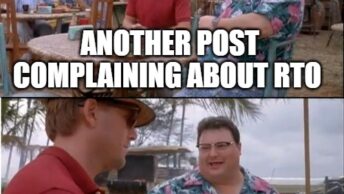Do less work for the same money.
I had been told this in a previous role. It was not negative. More of an exchange of privileged information. A show of mutual respect and understanding.
I have never pursued any job opportunity for its money. For much of my career, the goal was to work alongside writers and editors who would help me grow creatively and professionally.
Later, it was about learning all aspects of a business and applying a combination of strategy and hands-on skills to increase revenues, branding, and support marketing channels broadly.
In 2016, I earned $40K a year for one blog post and 200 to 300 product descriptions each month. I was over the moon.
Eight years later, in 2024, I dissected research studies for tidbits of data, interviewed health practitioners, wrote and edited long-form technical articles, managed writers and project timelines, developed content strategies, and tackled technical SEO tasks.
Some of these responsibilities were handed down to me, and I completed them in about ten hours a week.
This only required ten hours because I had refined my skills and developed so much industry knowledge that I could complete them more efficiently. For example, at one time, a 1,000-word blog would have taken me at least two full days to research, write, edit, and publish. Now, I could do the same job in under an hour. This applied to all aspects of my day-to-day.
I then worked up to ten more hours each week. The goal of doing more work than required was to challenge myself and improve my resume. Nobody requested this work.
For this effort, I earned $50K a year.
Those with a similar skill set would earn double or triple my compensation.
And still, I did not ask for more. The reasons were simple.
The first is that, at the time, I did not believe I deserved it. The second is that I wanted to fly under the radar.
I wanted to remain unseen because I was left with a lot of free time. During that time, I played video games, went for long walks, took up mountain biking, worked on a myriad of failed novels, and started building a relationship with the person who is my partner.
I did feel some shame, but never for long. The company had an open-book policy, and I could see that my work helped generate tens of millions in revenue and generous profits.
At the same time, the company spoke of work-life balance and the importance of personal growth. As all of my work was done on time, my performance reviews were solid, and nobody complained about the quality of my work, I took this to mean that my approach was fair and balanced.
Time marched on, and things began to change.
The company had leased new office space and wanted people to come in three, four, or even five days a week.
I exhaled a curse of anger, not for the loss of remote work but for the dollar figure the company had spent on the lease.
Do less work for the same money.
I had asked for more money. People told me they tried to get me more money. But they can’t afford to spend any more on salaries, it had been said.
This was not supposed to find its way to me. But there was that damn privileged information all over again.
Before these looming office mandates, I had moved in with my partner. The goal was to allow my partner to be near her work and her family and to save money on rent.
With this new office initiative, I would be taking a roughly $15K pay cut between time spent in traffic (3 hours daily), car payment to replace my aging car that could no longer handle the commute, and gas, tires, depreciation, all to do a job I had been doing effectively at home and without issue for years.
If I returned to the office, I felt entirely justified that I deserved something in return. The dollar figure in my head was no less than $65K. For that, I would do the same job that the company seemed so pleased with up until that point.
Do less work for the same money.
No more money came. With that, I should have exploded. Wildly applying to jobs before slamming my resignation on someone’s desk.
I still did nothing, and the company did nothing. I was politely redirected back to my usual tasks.
This was somewhat strange to me.
Since our teams were skeleton crews working diligently to keep the ship from sinking and I kept hearing rhetoric about people doing more, running a faster mile, raising the bar, and how change is necessary, I thought there might be some incentive to meet in the middle.
I had the time to take on more tasks, the skillset to complete them effectively, and the drive and dedication to helping the company reach new heights. And, the obvious, I would be cheaper than hiring new people.
More privileged information flowed into my ear.
Take advantage of this time and do not help those who will not help themselves.
My mind felt at ease. I would continue to do everything asked of me.
The office mandates were pushed off, but it was too late.
I decided to act my wage.
I worked my ten hours and diligently whittled that into five.
Then, my career was over. It took longer than expected. The reason for its end depends on who is privileged to what information. I have good reason to believe it had nothing to do with acting my wage.
Regardless, it was time to move forward.
And now, I find myself at an interesting crossroads: How should I continue?
Is it with a winner-takes-all mindset? Job hopping every two years to ensure I leave nothing on the table again?
That would undoubtedly help, given the new reality that it can take hundreds of applications and a year or longer to receive a job offer.
There is also the so-called death of loyalty between employees and employers, meaning that workers should seek to create the largest nest egg possible to protect themselves when a career ends a second, third, or fourth time.
But I am who I am today and where I am today because I did less work for the same money.
Reflecting on everything, I do not regret or harbor ill will toward anyone, but I ponder how some things might have changed.
Had I known I deserved more, might I have earned all that money but wound up alone without a partner or a dog? What good would that have done?
On the other hand, I could argue that we would have ended up in the same place but with a house, two dogs, and the funds to rain riches upon ourselves.
Without a time machine, these are questions never to be answered.
With the acceptance of that technological (or magical) absence, I will acknowledge that there is plenty of time left to make more mistakes, but with a bit more foresight this time. I realize that as a person with a skillset, I have value, and to demand that value is correct because our society has deemed this the right way to operate.
Even if you do not aspire to work, a career is part of a person’s life journey when they live in a society like ours. You should want to make the most of it in one way or another.
Perhaps there exists some unseen balance between the two. That should be my guiding star, even if I find myself back in a place where I am woefully undervalued, but my personal life is being enriched daily.
To top it off, I hope that any future employment offers the privilege of information. If it is someone who I manage wondering why they do not get more money, maybe I can share with them some profound truth… like,
Do less work for the same money.



